非谓语动词知识点概括及练习
小学KET非谓语动词知识点及习题讲解
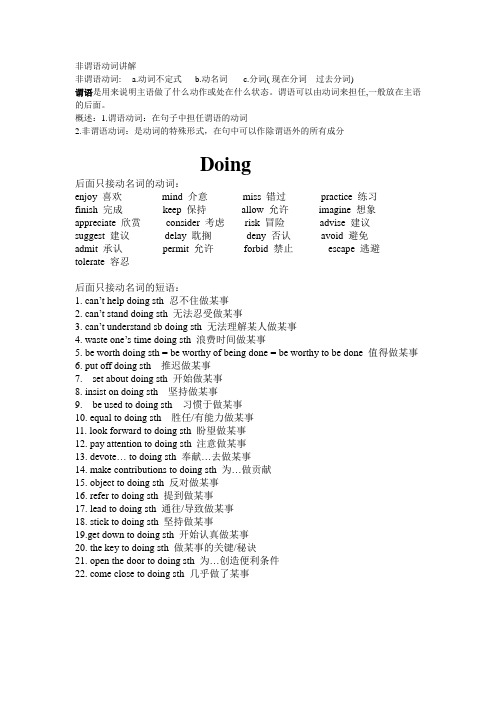
非谓语动词讲解非谓语动词: a.动词不定式 b.动名词 c.分词( 现在分词过去分词)谓语是用来说明主语做了什么动作或处在什么状态。
谓语可以由动词来担任,一般放在主语的后面。
概述:1.谓语动词:在句子中担任谓语的动词2.非谓语动词:是动词的特殊形式,在句中可以作除谓语外的所有成分Doing后面只接动名词的动词:enjoy 喜欢mind 介意miss 错过practice 练习finish 完成keep 保持allow 允许imagine 想象appreciate 欣赏consider 考虑risk 冒险advise 建议suggest 建议delay 耽搁deny 否认avoid 避免admit 承认permit 允许forbid 禁止escape 逃避tolerate 容忍后面只接动名词的短语:1. can’t help doing sth 忍不住做某事2. can’t stand doing sth 无法忍受做某事3. can’t understand sb doing sth 无法理解某人做某事4. waste one’s time doing sth 浪费时间做某事5. be worth doing sth = be worthy of being done = be worthy to be done 值得做某事6. put off doing sth 推迟做某事7. set about doing sth 开始做某事8. insist on doing sth 坚持做某事9. be used to doing sth 习惯于做某事10. equal to doing sth 胜任/有能力做某事11. look forward to doing sth 盼望做某事12. pay attention to doing sth 注意做某事13. devote… to doing sth 奉献…去做某事14. make contributions to doing sth 为…做贡献15. object to doing sth 反对做某事16. refer to doing sth 提到做某事17. lead to doing sth 通往/导致做某事18. stick to doing sth 坚持做某事19.get down to doing sth 开始认真做某事20. the key to doing sth 做某事的关键/秘诀21. open the door to doing sth 为…创造便利条件22. come close to doing sth 几乎做了某事To do后面只接不定式的动词:want 想要hope 希望wish 希望expect 期望fail 没能mean 打算decide 决定pretend 假装manage 设法offer 提供agree 同意promise 答应承诺undertake 承担refuse 拒绝attempt 企图打算happen 碰巧seem 似乎swear 发誓choose 选择determine 决定appear 好像hesitate 犹豫long 渴望后面只接不定式的短语:1.can’t wait to do sth 迫不及待做某事2.turn out to be 结果是3.can’t afford to do sth 付不起/抽不出(时间/钱)做某事4.spare no efforts to do sth 不遗余力做某事5.take the trouble to do sth 不辞辛苦做某事6.be made to do sth 被让做某事7.be allowed to do sth 被允许做某事8.be considered to do sth 被认为做某事9.encourage sb to do sth 鼓励某人做某事10.allow sb to do sth 允许某人做某事11.advise sb to do sth 建议某人做某事12.permit sb to do sth 允许某人做某事13.forbid sb to do sth 禁止某人做某事14.only to do sth 结果…15.be likely to do sth 可能做某事e sth to do sth 用…做某事ed to do sth 过去常常做某事18.be willing to do sth 乐意做某事19.persuade sb to do sth 说服某人做某事20.ask/ tell/ order sb to do sth 让/告诉/命令某人做某事21.warn sb to do sth 警告某人做某事22.remind sb to do sth 提醒某人做某事23.intend to do sth 打算做某事24.try/ do one’s best to do sth 尽最大努力做某事stop to do 停下来去做stop doing 停止做forget to do 忘记要做forget doing 忘记做过remember to do 记得要做remember doing 记得做过regret to do 遗憾要做regret doing 后悔做过try to do 企图做,尽力做try doing 试着做go on to do 继续做(另一件事)go on doing 继续做(同一件事)mean to do 打算做mean doing 意味做Begin to do 正准备做begin to do 正在做1.In some parts of London, missing a bus means _______ for another hour.A waitingB to waitingC waitD to be waiting2.Boys, don't forget _____ the windows before you leave the classroom.A. closingB. closedC. to closingD. to close3.She reached the top of the hill and stopped _______ on a big rock.A. to have restedB. restingC. to restD. rest4.Remember _______ the lights when you leave the office.A. to turn offB. turning offC. turn offD. to turning off5.They wanted _______( get ) on the bus, didn’t they?6.He said he wished _____( be ) a professor.7.It is difficult for the boy ________ (swim) across the river.8.She is too ill ________ (go) to school.9.She didn't mind _______ overtime.(work)10.She ought to be praised instead of ______ (criticize).11. Can you finish ___________(read) the book in three days?12. Stop ___________(talk) and listen to me carefully.13. Thank you very much for ____________(help) us14.. Granny is very ill and she doesn’t feel like ___________(eat) anything.15. The girl enjoys ___________(listen) to light music.16.. Do you remember ___________(buy) me a beautiful skirt on my 13th birthday?17. We couldn’t help _________(laugh) after we heard the funny story.18.. What about ___________(go) out for a walk?19. It was great fun _____ a picnic on the hill. A. to have B. of havingC. have D. Had20.It’s bad for your eyes ____ computer games for a long time.A. playsB. to playC. Play21. Why not ____?A. let him to go homeB. to let him go homeC. let him go homeD. to let him to go home22. . It ____ Jack twenty minutes ____ the math problem yesterday.A. took; to work outB. takes; worked outC. has taken; work outD. is taking; working out23 When you leave, don’t forget ____ off the light.A. to turnB. turningC. turnD. turned24.Who do you think you’d like ____?A. to make friendsB. make friendsC. to make friends withD. make friends with25.John asked David how ____ Christmas. A. celebrating B. to celebrate C. to be celebrated26.It’s very kind ____ you to ____ me ____ the heavy bag.A. for; tell; to takeB. of; thank; forC. to; speak; to haveD. of; help;carry27.Have you decided ____?A. to go with whomB. whom to go withC. whom go withD. with whom to go28.The policeman warned the young man____ after drinking.A. never to driveB. to never driveC. never drivingD. never drive29.My grandfather is used ____ a hat in winter.A. to wearB. for wearingC. wearingD. to wearing30. I find ____ him all about it.A. necessary to tellB. that necessary toC. necessary it to tellD. it necessary to tell31. The old man seems ____ in a great hurry.A. beB. to beC. beingD. to being32.It’s time for supper now. Let’s ______ it.A. stop to haveB. stop havingC. to stop to haveD. to stop having33.You are not expected ____ such long hours.A. to workB. workingC. workedD. work34.His father agreed ____ $ 4,000 for the car.A. with payingB. to payingC. to payD. on paying35.The man pretended ____ when we saw him.A. to be eatenB. eatingC. being eatingD. to be eating36.He doesn’t know _____.A. when to doB. what to doC. how to doD. where to do37.. Today we use machines _____ us do most of our work.A. to helpB. helpC. helpingD. helped38.. She preferred me _____ there.A. to stayB. would stayC. I stayD. stay39.We’re going to help _____ the trees.A. wateredB. wateringC. to wateringD. water。
非谓语动词讲解及练习题
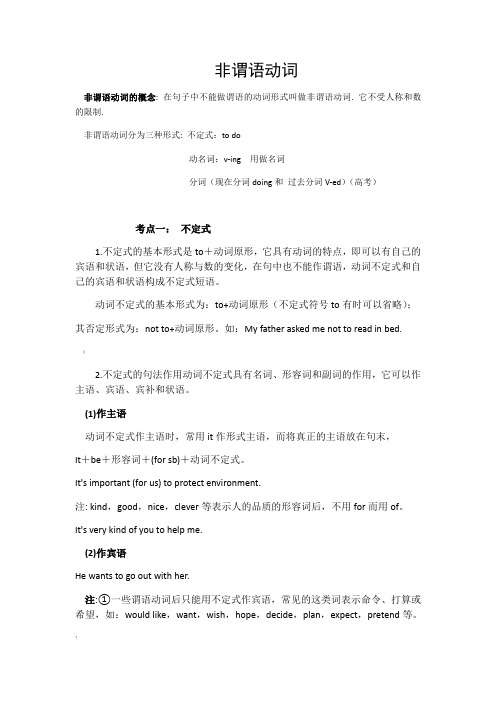
非谓语动词非谓语动词的概念: 在句子中不能做谓语的动词形式叫做非谓语动词. 它不受人称和数的限制.非谓语动词分为三种形式: 不定式:to do动名词:v-ing 用做名词分词(现在分词doing和过去分词V-ed)(高考)考点一:不定式1.不定式的基本形式是to+动词原形,它具有动词的特点,即可以有自己的宾语和状语,但它没有人称与数的变化,在句中也不能作谓语,动词不定式和自己的宾语和状语构成不定式短语。
动词不定式的基本形式为:to+动词原形(不定式符号to有时可以省略);其否定形式为:not to+动词原形。
如:My father asked me not to read in bed.)2.不定式的句法作用动词不定式具有名词、形容词和副词的作用,它可以作主语、宾语、宾补和状语。
(1)作主语动词不定式作主语时,常用it作形式主语,而将真正的主语放在句末,It+be+形容词+(for sb)+动词不定式。
It's important (for us) to protect environment.注: kind,good,nice,clever等表示人的品质的形容词后,不用for而用of。
It's very kind of you to help me.(2)作宾语He wants to go out with her.注:①一些谓语动词后只能用不定式作宾语,常见的这类词表示命令、打算或希望,如:would like,want,wish,hope,decide,plan,expect,pretend等。
?Would you like to see a film this evening②当不定式作宾语时,通常还可以用it作形式宾语,真正的宾语是不定式。
在find,think后跟不定式作宾语时,常用it代替,而将真正的宾语放在句末。
I find it easy to read English every day.(3)作表语句型:主语+ be + to do sth .如:My group’s task is to find out the cost to go by train.(4)作目的状语>如:He opened the door for her to come in. 他打开门让她进来。
非谓语动词(动名词、动词不定式)总结及练习(附答案)

非谓语动词(动名词、动词不定式)总结及练习非谓语动词在句子中充当除了谓语....以外其它成份的动词形式,不受人称和数的限制。
在英语中,非谓语动词主要有动名词和动词不定式两种形式。
第一部分动名词1.0动名词是在动词后面+ ing (doing)的形式,把动词变成名词来使用。
比如:live → living, see → seeing, go → going,凡此种种。
2.0 动名词在句子中的成份2.1 动名词做主语e.g. Seeing is believing. seeing为动名词,在句子中做主语Learning Japanese is hard. 为动名词,在句子中做主语2.2 动名词作宾语, 此时多与一些固定的谓语动词作搭配, 见附表e.g. I like reading.He enjoyed living in France.2.3 动名词作介词的宾语,常常与类似如下短语的介词连用,如:dream of, keep awayfrom, be good at, be interested in …e.g. He is interested in drawing. 动名词drawing作in的宾语Please keep away from lying. 动名词lying作from的宾语2.4 动名词作表语e.g. Seeing is believing. 动名词believing作表语My hobby is skating. 动名词skating作表语2.5 动名词作定语, 对修饰的名词形成一种定义e.g. a dining room, a swimming pool, a waiting room…2.6 动名词作状语,逻辑主语须与主句主语报纸一致e.g. Hearing the good news, she couldn’t helping laughing. (时间状语)Having received the letter, I decided to write back. (时间状语)Having been to the Great Wall for many times, he didn’t go last week. (原因状语)Working hard, you will succeed.(条件状语)Though working hard from day to day, he didn’t get rich. (让步状语)2.7 动名词作宾语补足语,常与感官等动词连用e.g. I saw him leavingPlease keep him working.第二部分动词不定式1.0 动词不定式也是一种非谓语动词形式,其结构为“to+动词原形”,其中to不是介词而是动词不定式的符号,动词不定式没有人称和数的变化。
常见的非谓语动词知识点总结
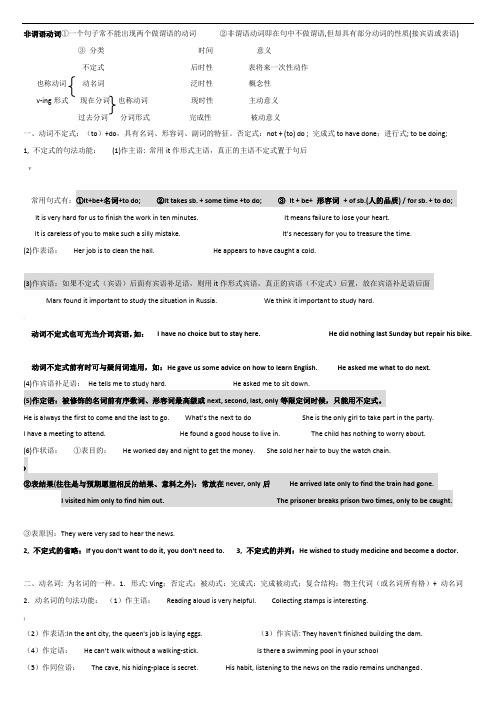
非谓语动词①一个句子常不能出现两个做谓语的动词②非谓语动词即在句中不做谓语,但却具有部分动词的性质(接宾语或表语)③分类时间意义不定式后时性表将来一次性动作也称动词动名词泛时性概念性v-ing形式现在分词也称动词现时性主动意义过去分词分词形式完成性被动意义一、动词不定式:(to)+do,具有名词、形容词、副词的特征。
否定式:not + (to) do ; 完成式to have done;进行式; to be doing;1, 不定式的句法功能:(1)作主语: 常用it作形式主语,真正的主语不定式置于句后¥常用句式有:①It+be+名词+to do; ②It takes sb. + some time +to do; ③It + be+ 形容词+ of sb.(人的品质) / for sb. + to do;It is very hard for us to finish the work in ten minutes. It means failure to lose your heart.It is careless of you to make such a silly mistake. It’s necessary for you to treasure the time.(2)作表语:Her job is to clean the hall. He appears to have caught a cold.(3)作宾语:如果不定式(宾语)后面有宾语补足语,则用it作形式宾语,真正的宾语(不定式)后置,放在宾语补足语后面Marx found it important to study the situation in Russia. We think it important to study hard.·动词不定式也可充当介词宾语,如:I have no choice but to stay here. He did nothing last Sunday but repair his bike.动词不定式前有时可与疑问词连用,如:He gave us some advice on how to learn English. He asked me what to do next.(4)作宾语补足语:He tells me to study hard. He asked me to sit down.(5)作定语:被修饰的名词前有序数词、形容词最高级或next, second, last, only等限定词时候,只能用不定式。
非谓语动词总结知识点

非谓语动词总结知识点一、动词不定式(Infinitive)动词不定式由“to + 动词原形”构成。
动词不定式在句子中可以作多种成分,具有名词的性质。
下面是动词不定式的主要用法:1. 作主语:To travel around the world is my dream.2. 作宾语:I want to study English.3. 作定语:The best way to learn English is to practice speaking.4. 作表语:My goal is to improve my English.5. 作状语:He goes to the library to study every day.当动词不定式作为宾语补足语时,它可以由动词原形构成(Bare Infinitive)。
例如:I saw him draw a picture yesterday. (我昨天看到他画了一幅画。
)二、动名词(Gerund)动名词是由动词的现在分词形式加上动词-ing构成的。
动名词在句子中可以作多种成分,具有名词的性质。
下面是动名词的主要用法:1. 作主语:Reading is my hobby.2. 作宾语:I enjoy swimming in the ocean.3. 作定语:I like watching movies.4. 作表语:His favorite activity is playing basketball.5. 作状语:He left without saying goodbye.动名词与不定式的区别在于,动名词具有名词的性质,而动词不定式具有动词的性质。
例如:I like swimming. (我喜欢游泳。
)I like to swim. (我喜欢游泳。
)动名词与动词不定式作宾语时,有时可以根据动词选择使用不定式还是动名词。
例如:I stopped smoking. (我戒烟了。
(完整版)高考英语非谓语动词知识点
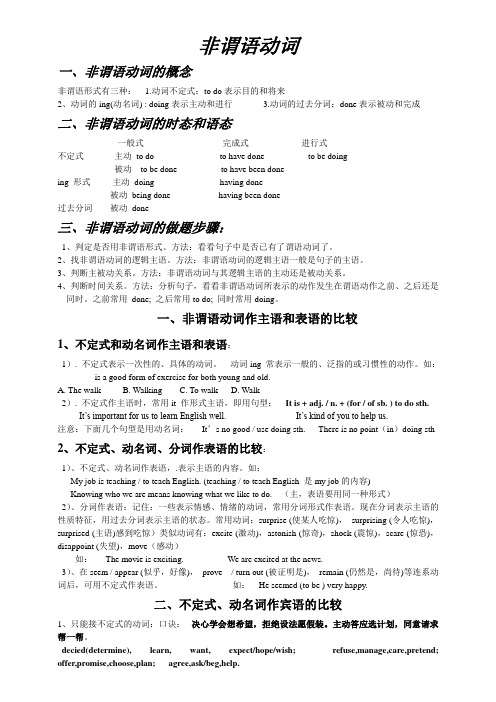
非谓语动词一、非谓语动词的概念非谓语形式有三种: 1.动词不定式:to do表示目的和将来2、动词的ing(动名词) : doing表示主动和进行 3.动词的过去分词:done表示被动和完成二、非谓语动词的时态和语态一般式完成式进行式不定式主动to do to have done to be doing被动to be done to have been doneing 形式主动doing having done被动being done having been done过去分词被动done三、非谓语动词的做题步骤:1、判定是否用非谓语形式。
方法:看看句子中是否已有了谓语动词了。
2、找非谓语动词的逻辑主语。
方法:非谓语动词的逻辑主语一般是句子的主语。
3、判断主被动关系。
方法:非谓语动词与其逻辑主语的主动还是被动关系。
4、判断时间关系。
方法:分析句子,看看非谓语动词所表示的动作发生在谓语动作之前、之后还是同时。
之前常用done; 之后常用to do; 同时常用doing。
一、非谓语动词作主语和表语的比较1、不定式和动名词作主语和表语:1). 不定式表示一次性的、具体的动词。
动词ing 常表示一般的、泛指的或习惯性的动作。
如:________ is a good form of exercise for both young and old.A. The walkB. WalkingC. To walkD. Walk2). 不定式作主语时,常用it 作形式主语,即用句型:It is + adj. / n. + (for / of sb. ) to do sth.It’s important for us to learn English well. It’s kind of you to help us.注意:下面几个句型是用动名词:It’s no good / use doing sth. There is no point(in)doing sth2、不定式、动名词、分词作表语的比较:1)、不定式、动名词作表语,.表示主语的内容。
初中英语-非谓语动词知识点与练习以及答案

非谓语动词(一) 非谓语动词的概念 动词的基本用法是作谓语. 当句中已经有了谓语动词了, 要选或要填的动词 就只能用非谓语形式了。
非谓语形式有三种: 1、动词不定式: to do 2、动词的 ing : doing 3、 动 词的过去分词:done(二) 三种形式的含义(基本用法)不定式:表示目的和将来;动词的ing :表示主动和进行;过去分词:表示 被动和完成。
(三) 详细用法动名词(一)动名词的构成:动名词一般由 动词原形+ing "构成主动式 doing having done 一般时态 Do you mind my smoking here ?(动作发生在谓语动词表示的动作之后或者两个动作同时发生 )完成时态 I regret not having StUdied hard.(动作发生在谓语动词表示的 动作之前)2. 在下面两种句型中,只能用动名词There + be + no + 动名词There is no getting along with him 。
It is +no use/good/ fun/nice + 动名词It is no use learning English without speaking 。
3. 只可以接动名词的动词或者动词短语dislike admit enjoy deny mind miss risk finish avoid consider excuse suggestpractice be worth keep on can not help give up put off leave off lead to 3.比较:1) 共同点:动词不定式结构和动词的 —ing 形式都被称之为非谓语结构,因 此它们一般都可以放在句中除了谓语之外的其他位置.2) 区别形式般式完成式 被动式 being done having been done① 动词不定式的基本含义是表示谓语动词后面的动作还未发生, 此外,若谓语动词后面的动作发生过了也用不定式,而-ing 分词的基本含义一般 则表示动作正在发生或进行。
非谓语动词知识点梳理及经典练习(超详细)含答案解析

非谓语动词知识点梳理及经典练习(超详细)含答案解析一、非谓语动词1.—I didn't hear you come in just now.—That's good. I tried______the baby up.A. to wakeB. not to wakeC. waking【答案】 B【解析】【分析】——刚才我没有听见你进来。
——还不错.我尽量不吵醒婴儿。
try to dosth尽力做某事,否定形式在to前面加not.故选B.【点评】考查动词不定式的否定式。
2.I like the TV program The Reader best. I think we should spend as much time as we can inour spare time.A. readB. to readC. readingD. reads【答案】 B【解析】【分析】句意:我最喜欢电视节目《朗读者》。
我认为在业余时间,我们应该尽可能多的花费时间读书。
读书是花费时间的目的,在句中做状语,应使用动词不定式,spend time doing sth,表示花钱或时间做了某事,强调做了,根据should,可知事情还没做,因此不能选C,故答案是B。
【点评】考查非谓语动词——动词不定式,注意做目的状语一般应使用动词不定式,同时注意不要受到spend…doing固定搭配的影响。
3.Nowadays,most people prefer to________ computer games rather than ___________ books.A. play;readingB. play;readC. playing; reading【答案】 B【解析】【分析】句意:现在,大部分人比起读书更喜欢玩电脑游戏。
prefer to doA rather than do B比起B更喜欢做A。
故答案为B。
(完整版)非谓语动词语法讲解及练习
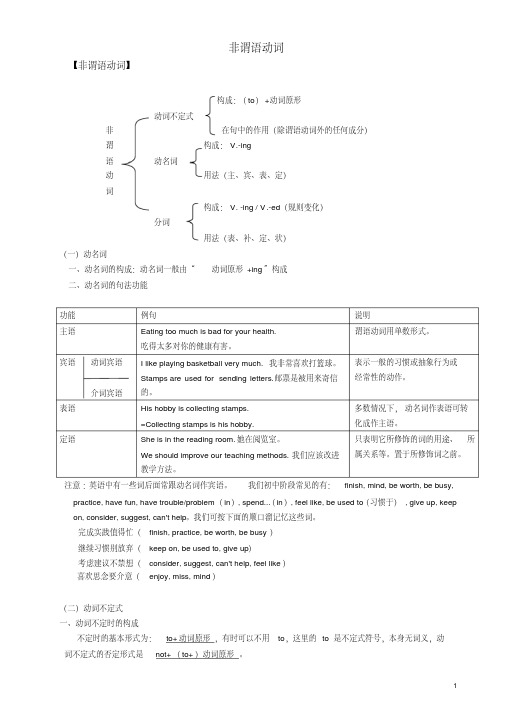
非谓语动词【非谓语动词】构成:(to)+动词原形动词不定式非在句中的作用(除谓语动词外的任何成分)谓构成:V.-ing语动名词动用法(主、宾、表、定)词构成:V. -ing / V.-ed(规则变化)分词用法(表、补、定、状)(一)动名词一、动名词的构成:动名词一般由“动词原形+ing”构成二、动名词的句法功能功能例句说明主语Eating too much is bad for your health.吃得太多对你的健康有害。
谓语动词用单数形式。
宾语动词宾语介词宾语I like playing basketball very much.我非常喜欢打篮球。
Stamps are used for sending letters.邮票是被用来寄信的。
表示一般的习惯或抽象行为或经常性的动作。
表语His hobby is collecting stamps.=Collecting stamps is his hobby. 多数情况下,动名词作表语可转化成作主语。
定语She is in the reading room.她在阅览室。
We should improve our teaching methods.我们应该改进教学方法。
只表明它所修饰的词的用途、所属关系等。
置于所修饰词之前。
注意:英语中有一些词后面常跟动名词作宾语。
我们初中阶段常见的有:finish, mind, be worth, be busy, practice, have fun, have trouble/problem(in), spend...(in), feel like, be used to(习惯于), give up, keep on, consider, suggest, can't help。
我们可按下面的顺口溜记忆这些词。
完成实践值得忙(finish, practice, be worth, be busy)继续习惯别放弃(keep on, be used to, give up)考虑建议不禁想(consider, suggest, can't help, feel like)喜欢思念要介意(enjoy, miss, mind)(二)动词不定式一、动词不定时的构成不定时的基本形式为:to+动词原形,有时可以不用to,这里的to 是不定式符号,本身无词义,动词不定式的否定形式是not+(to+)动词原形。
初中英语语法非谓语动词知识点讲解及专项练习

初中英语语法非谓语动词知识点讲解及专项练习一非谓语动词的概念在句子中充当除谓语以外的句子成分的动词形式叫做非谓语动词它不受人称和数的限制非谓语动词分为三种形式:不定式:to+动词原形动名词:动词原形+ing分词(现在分词和过去分词)二、动名词的用法动名词是由动词原形+ ing 构成,形式同现在分词形式一样,其否定形式是not + 动词原形+ ing。
1、动名词作主语:Talking like that is not polite. 那样谈话不礼貌。
Learning from others is important. 向别人学习很重要。
Putting on more clothes is not so good . 多穿衣服不一定好。
动名词作主语通常用一般式,可以像动词不定式一样,用it 先行词代替,而把动名词写在后面。
It's no use waiting here, let's go home. 在这儿等着也没用,我们回家吧。
It's very difficult climbing this mountain. 爬这座山很困难。
2、动名词作表语The nurse's job is looking after the patients. 护士的工作是护理病人。
Seeing is believing. 眼见为实。
3、动名词作定语She is studying in the reading room. 她在阅览室学习。
He slept in the sleeping bag. 他在睡袋里睡觉。
4、动名词作宾语Please stop smoking in the house. 请不要在家里抽烟。
I like reading in the forest. 我喜欢在树林里读书。
Do you mind my opening the windows? 你介意我打开窗户吗?She is found of collecting stamp. 她喜欢集邮。
非谓语动词知识点详解(初中英语专项复习) 4

Do you have something to say?你有什么要说的吗?
作状语
不定式常可用作状语,修饰动词,表示行为的目的、结果和原因。
To do a good job,we must h,同意,帮助(like, agree, help)
(4)希望,决定,开始(hope/wish, decide, begin/start)
【巧学妙记】
巧记后跟动名词作宾语的动词
喜欢(enjoy)不断(keep)提建议(suggest)
盼望(look forward to)习惯(be used to)却完毕(finish)
考向三:分词
(一)现在分词和过去分词的构成
现在分词由v.+ing构成,过去分词v.+ed(规则动词)构成。
(二)分词的用法
句子成分
用法
例句
作定语
现在分词表示正在进行,有主动的含义,过去分词表示已经完成,有被动的含义。
The crying boy annoyed us a lot.那个哭泣的男孩使我们很烦恼。
通常表示主语正在进行的另一动作,来对主语的主要动作加以修饰。
I got home, feeling very tired.我疲惫地回到家里。
非谓语动词解题七大原则
原则一:用作目的状语,原则上要用不定式。
原则二:用作伴随状语,原则上要用-ing。
原则三:用作结果状语时,可用-ing或不定式,其区别是,一般用-ing,表示一定逻辑的结果,即结果在意料之中。不定式作结果状语表示非逻辑的结果,即结果在意料之外。
No matter what happened, I won’t give up achieving my dream.不管发生了什么事情,我都不会放弃去实现我的梦想。
非谓语动词讲解(附练习及答案)
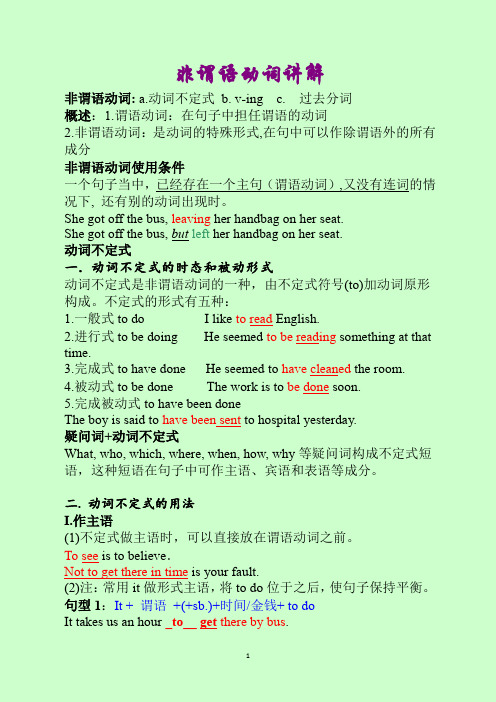
非谓语动词讲解非谓语动词: a.动词不定式 b. v-ing c. 过去分词概述:1.谓语动词:在句子中担任谓语的动词2.非谓语动词:是动词的特殊形式,在句中可以作除谓语外的所有成分非谓语动词使用条件一个句子当中,已经存在一个主句(谓语动词),又没有连词的情况下, 还有别的动词出现时。
She got off the bus, leaving her handbag on her seat.She got off the bus, but left her handbag on her seat.动词不定式一.动词不定式的时态和被动形式动词不定式是非谓语动词的一种,由不定式符号(to)加动词原形构成。
不定式的形式有五种:1.一般式to do I like to read English.2.进行式to be doing He seemed to be reading something at that time.3.完成式to have done He seemed to have cleaned the room.4.被动式to be done The work is to be done soon.5.完成被动式to have been doneThe boy is said to have been sent to hospital yesterday.疑问词+动词不定式What, who, which, where, when, how, why等疑问词构成不定式短语,这种短语在句子中可作主语、宾语和表语等成分。
二. 动词不定式的用法I.作主语(1)不定式做主语时,可以直接放在谓语动词之前。
To see is to believe.Not to get there in time is your fault.(2)注:常用it做形式主语,将to do位于之后,使句子保持平衡。
句型1:It + 谓语+(+sb.)+时间/金钱+ to doIt takes us an hour _to__ get there by bus.It costs you only $ 100 a month to cook at home.It seemed impossible to save money.句型2:It’s + n. (+ for sb) + to doIt’s our duty _to_ help the poor.It is a great enjoyment _to_ spend our holiday in the countryside..It is a great honor for us to be present at your birthday party.句型3:It is + adj (+ for sb)to do sth(是形容事物的性质的)It is + adj (+ of sb)to do sth(是形容人的品质的)It is easy for me to finish this work before ten.It is very kind of you to give me some help.It's impolite of you to speak to the teacher like that.疑问词+不定式作主语When to start remains undecided.1.It is easy to get there by bus or taxi.2. It takes about 3 hours to see all the birds.3. It is also impolite to speak with your mouth full when you are eating.4. It’s our duty to take good care of the old.5. How long did it take you to finish the work?6. It is stupid of you to write down everything the teacher says.7. When to start has not been decided.8. It seemed selfish of him not to give them anything.9. It’s necessary for you to lock the car when you do not use it.10. It is useful for our health to do morning exercises.II.作宾语接不定式做宾语I want to know this matter.I don’t expect to meet you here(1)常见动词有:like, demand, expect, promise, begin, determine, refuse, fail, manage, learn, seem, forget, want, prepare, pretend, plan, wish等They want to get_( get ) on the bus, didn’t they?He said he wished __to be ( be ) a professor.(2)it作形式宾语I find/feel to work with him interesting .I find/feel it interesting to work with him.Subject+ find/think/feel/make/ consider… it+adj/n + to do sth.1.We thought_it__better__to_start early.2.Do you consider_it__better not_to_go?3.I feel_it_my duty_to_change all that.4.We think it __ important _ to _ obey the law.5.I know _ it _ impossible _ to _ finish so much homework in a day. (3)疑问词+不定式作宾语常常放在这些动词的后面作宾语:tell, advise, show, teach, find out, decide, discuss, learn, explain…He taught us how to use the tool.No one could tell me where to get the book.The dictionary didn’t tell the Frenchman how to pronounce the word.(4) 作介词but, except, besides的宾语。
非谓语动词总结及练习
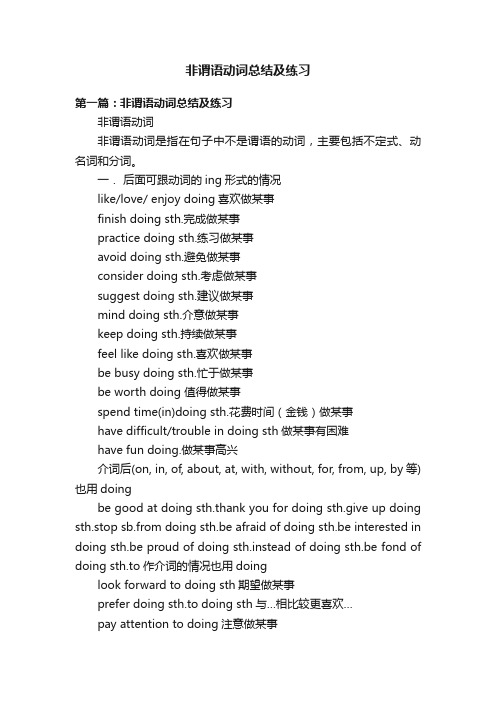
非谓语动词总结及练习第一篇:非谓语动词总结及练习非谓语动词非谓语动词是指在句子中不是谓语的动词,主要包括不定式、动名词和分词。
一.后面可跟动词的ing形式的情况like/love/ enjoy doing喜欢做某事finish doing sth.完成做某事practice doing sth.练习做某事avoid doing sth.避免做某事consider doing sth.考虑做某事suggest doing sth.建议做某事mind doing sth.介意做某事keep doing sth.持续做某事feel like doing sth.喜欢做某事be busy doing sth.忙于做某事be worth doing 值得做某事spend time(in)doing sth.花费时间(金钱)做某事have difficult/trouble in doing sth做某事有困难have fun doing.做某事高兴介词后(on, in, of, about, at, with, without, for, from, up, by等)也用doingbe good at doing sth.thank you for doing sth.give up doing sth.stop sb.from doing sth.be afraid of doing sth.be interested in doing sth.be proud of doing sth.instead of doing sth.be fond of doing sth.to作介词的情况也用doinglook forward to doing sth期望做某事prefer doing sth.to doing sth与…相比较更喜欢…pay attention to doing注意做某事be/get used to doing sth.习惯于做某事make a contribution to为…做贡献二.后面可跟动词的不定式形式的情况agree to do同意去做afford to do买得起decide to do决定去做hope to do希望去做wish to do希望去做fail to do做某事失败去 plan to do打算去做pretend to do假装去做refuse to do拒绝去做 would like to do想要去做want to do想要去做某事learn to do 学做 prefer to do sth.喜欢(爱)做某事sb.seem to do sth好像做某事 used to do sth.过去常常做某事allow sb.to do sth.允许某人去做某事asked sb.(not)to do sth.叫某人做事某事(叫某人不要去做某事)tell sb.(not)to do sth.叫某人去(不要)做某事follow sb.to do sth.跟随某人去做某事get sb.to do sth.让某人做某事warn sb.(not)to do sth.警告某人做某事(或不要做某事)be amazed to do sth.对做某事感到惊讶be afraid to do sth.害怕做某事be excited to do sth.对做……感到兴奋be frightened to do sth.害怕去做某事be glad/happy to do sth.高兴去做某事be/get ready to do sth.准备做某事be sorry to do sth.对做某事感到抱歉be surprised to do sth.对做某事感到惊奇can’t wait to do sth.迫不急待地去做某事get/have a chance to do sth.得到一个做某事的机会It’s + adj.+(for sb.)to do sth.(对某人来说)做某事是…It’s +adj.+(of sb.)to do sth.做某事你是…的It takes sb.some time/money to do sth.花费某人多长时间做某事It’s best for sb.to do sth.对某人来说做某事是最好的It’s time for sb.to do sth.是某人做某事的时候了too…(for sb.)to …太……以致不能…… ==not… enough to doprefer to do sth.rather than do sth.宁愿……而不愿……(常考)something to eat/drink一些吃/喝的东西(词不定式放在something等后修饰这些 Sth.is hard/difficult/easy to do 做好某事很难/容易take turns to do sth.轮流做……There is no time(for sb.)to do sth.对(某人来说)没时间做某事了There is no need(for sb.)to do sth.对某人来说没必要做某事try/do one’s best to do sth.尽力去做某事三、后既能跟不定式也能跟动名词的情况:1、后加不定式或动名词意思相近的动词有些动词接doing和to do意义相近像like(喜欢),love(喜欢),hate(憎恨),prefer(宁可),begin(开始),start(开始),continue(继续)。
最全的非谓语动词知识点总结
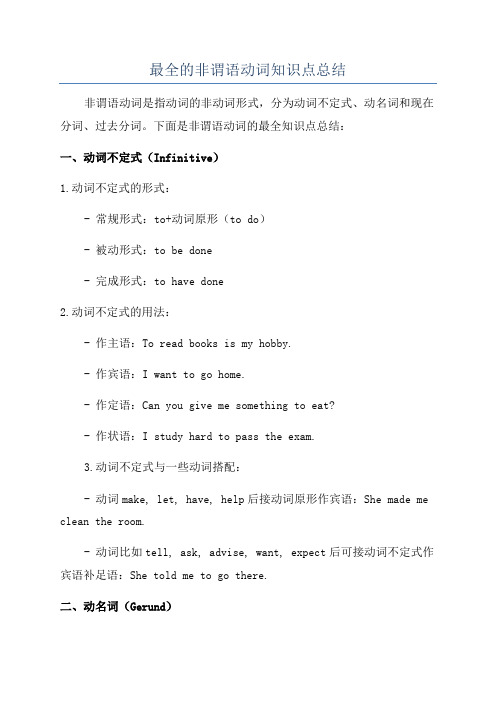
最全的非谓语动词知识点总结非谓语动词是指动词的非动词形式,分为动词不定式、动名词和现在分词、过去分词。
下面是非谓语动词的最全知识点总结:一、动词不定式(Infinitive)1.动词不定式的形式:- 常规形式:to+动词原形(to do)- 被动形式:to be done- 完成形式:to have done2.动词不定式的用法:- 作主语:To read books is my hobby.- 作宾语:I want to go home.- 作定语:Can you give me something to eat?- 作状语:I study hard to pass the exam.3.动词不定式与一些动词搭配:- 动词make, let, have, help后接动词原形作宾语:She made me clean the room.- 动词比如tell, ask, advise, want, expect后可接动词不定式作宾语补足语:She told me to go there.二、动名词(Gerund)1.动名词的形式:- 动词原形+ing(doing)2.动名词的用法:- 作主语:Swimming is good for health.- 作宾语:I enjoy reading books.- 作表语:His job is teaching English.- 作定语:The running water sounds relaxing.- 作状语:I walked home, singing songs.3.动名词与一些动词搭配:- 动词stop, finish, keep, mind后接动名词作宾语:He finished reading the book.- 动词enjoy, dislike, mind后接动名词作宾语:I enjoy swimming.三、现在分词(Present Participle)1.现在分词的形式:- 原形+ing(doing)2.现在分词的用法:- 作定语:The crying baby needs attention.- 作状语:He left the party, feeling disappointed.3.现在分词与一些动词搭配:- 动词keep, catch, find后接现在分词作宾补:I caught him stealing my money.- 动词see, hear, notice后接现在分词作宾补:I saw him walking in the park.四、过去分词(Past Participle)1.过去分词的形式:- 动词的过去分词形式(done)2.过去分词的用法:- 用于完成时态:I have finished my homework.- 用于被动语态:The book was written by him.3.过去分词与一些动词搭配:- 动词have, has, had, get, be等后接过去分词构成完成时态:He has eaten breakfast.- 动词make, let, have, get后接过去分词构成被动语态:She was made to clean the room.。
非谓语动词知识点归纳 及答案
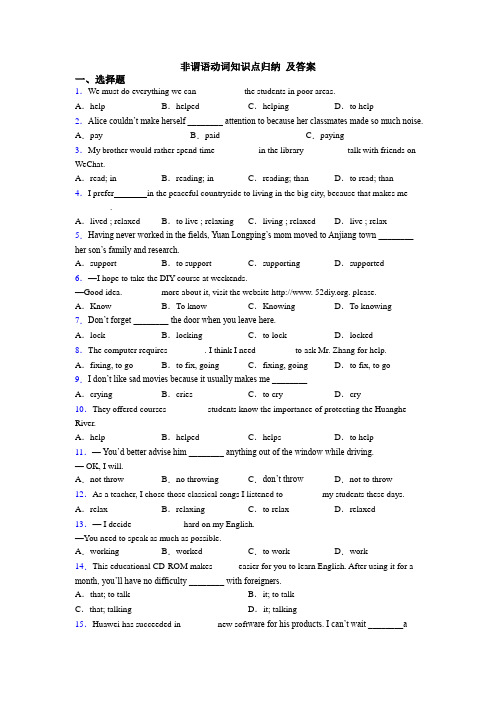
非谓语动词知识点归纳及答案一、选择题1.We must do everything we can __________ the students in poor areas.A.help B.helped C.helping D.to help2.Alice couldn’t make herself ________ attention to because her classmates made so much noise. A.pay B.paid C.paying3.My brother would rather spend time _________ in the library _________ talk with friends on WeChat.A.read; in B.reading; in C.reading; than D.to read; than4.I prefer in the peaceful countryside to living in the big city, because that makes me________.A.lived ; relaxed B.to live ; relaxing C.living ; relaxed D.live ; relax 5.Having never worked in the fields, Yuan Longping’s mom moved to Anjiang town ________ her son’s family and research.A.support B.to support C.supporting D.supported6.—I hope to take the DIY course at weekends.—Good idea. ________ more about it, visit the website http://www. . please.A.Know B.To know C.Knowing D.To knowing 7.Don’t forget ________ the door when you leave here.A.lock B.locking C.to lock D.locked8.The computer requires ________. I think I need ________ to ask Mr. Zhang for help. A.fixing, to go B.to fix, going C.fixing, going D.to fix, to go9.I don’t like sad movies because it usually makes me ________A.crying B.cries C.to cry D.cry10.They offered courses_________ students know the importance of protecting the Huanghe River.A.help B.helped C.helps D.to help 11.—You’d better advise him ________ anything out of the window while driving.— OK, I will.A.not throw B.no throwing C.don’t throw D.not to throw 12.As a teacher, I chose those classical songs I listened to ________ my students these days. A.relax B.relaxing C.to relax D.relaxed13.— I decide ___________ hard on my English.—You need to speak as much as possible.A.working B.worked C.to work D.work14.This educational CD-ROM makes _____ easier for you to learn English. After using it for a month, you’ll have no difficulty ________ with foreigners.A.that; to talk B.it; to talkC.that; talking D.it; talking15.Huawei has succeeded in ________new soft ware for his products. I can’t wait ________anew Huawei mobile.A.developing, to buy B.developed, buying C.developing, buy D.develop, buying 16.I don’t mind_____ in such a small room .A.to live B.to living C.living D.live17.It’s my honor _____ to give a talk here.A.to invite B.to be invited C.inviting D.invite18.How much work have they finished ________ for the welcome party?A.prepared B.to prepare C.preparing D.to be prepared 19.―What do you think of the action movie Mulan?―It comes from an old Chin ese story. Mulan dresses up as a boy and takes her father's place in the army.A.to fight B.fighting C.fights D.fought 20.—Suzy, when you leave your bedroom, please turn off the lights energy.—I will, Mum.A.save B.to save C.saving D.saved 21.Helen was made the task in two days.A.finish B.to finishing C.finished D.to finish 22.(2016•盐城市)We must do everything we can ______waste water from running into rivers . A.prevent B.prevented C.preventing D.to prevent 23.—We set World Reading Day ________ teens to form a good reading habit.—Nowadays, people are more aware of the importance of reading.A.to encourage B.encouraging C.encouraged D.encourage 24.(江苏东台八校九年级检测)The Tiger Mom went out the bedroom, ________ her daughter crying sadly.A.left B.leaving C.leaves D.has left25.My watch doesn’t work. I must have it ________.A.Repairing B.to repair C.repair D.repaired 26.There is something wrong with my DVD player. I’ll have it ________.A.fixing B.to fix C.fixes D.fixed27.I think that AI(人工智能) ________ in many fields will ________ to help us solve many problems in the future.A.used;be used B.is used;be used C.used;use28.A medical team, ________ five experienced doctors and ten skillful nurses, was sent to the earthquake-stricken area in Turkey.A.made up of B.made of C.made from D.made by 29.The music ________ by Mozart is well known ________ people all over the world. A.writes; as B.written; for C.written; as D.written; to 30.—Sandy, your mobile phone is ringing.—Wait a moment 1 It's dangerous ________ it while crossing the street.A.answer B.to answer C.answering D.answers31.The details the teachers asks to pay attention to ________ our English are very important. A.to improve B.improve C.improving D.improved 32.When Lily opened the door, she found her little cat ________ in bed.A.lay B.to lie C.lied D.lying33.On her way home, Lucy saw a thief ______ in a shop. She stopped ______ 110 at once. A.steal; call B.to steal; callC.stealing; to call D.stealing; calling34.While I ____on the street, I found a little boy ______ near the park.A.am walking, crying B.was walking, cry C.was walking, crying D.walked, cry 35.It's impolite to keep someone________ for a long time.A.wait B.to wait C.waiting D.have waited 36.Mr. Grea found Tom a novel in class when he came in.A.is reading B.reading C.read D.to read37.I saw her flowers in the garden when I passed by.A.to water B.water C.watering D.watered38.---Is Jack in the next room ?---It’s hard to say. But I heard him _____ loudly when I passed by just now.A.speak B.to speak C.spoken D.speaking 39.The list _________ 19 trillion data _________ over nine years from 390 cities across 48 countries.A.based on; collected B.based on; collectingC.is based on; collected D.is based on; collecting40.When I got back home I saw a note on the door ____ “Sorry to miss you; will call later.”A.say B.says C.to say D.saying41.If you want to make yourself ______, you should speak clearly and slowly.A.to understand B.understood C.understand D.understanding 42.The computer doesn’t work. Let’s have it __________ tomorrow.A.repair B.repaired C.repairing D.will repair43.I think middle school students should not get their hair _______.A.color B.colors C.colored D.coloring 44.His pronunciation is better, for he kept ______ a short passage after the tape every morning. A.to read B.readingC.read D.reads45.-This computer doesn’t work. -Really? I will have it tomorrow.A.repaired B.repair C.to be repaired D.be repaired 46.Gina is the only girl ______ a coat.A.who wear B.who wearing C.wearing D.wears47.We middle school students are advised _________ at least one hour _________ exercise every day to stay healthy.A.spending; to take B.spending; taking C.to spend; to take D.to spend; taking 48.Nowadays students have more time to practice ________ English after class.A.speak B.spoke C.speaking D.to speak49.I prefer _________ some shopping to ________ camping since the weather isn’t lovely. A.do; going B.doing; go C.do; go D.doing; going 50.These young trees will require ________carefully.A.to look after B.being looked after C.having looked after D. looking after 51.David practices________ the piano hard and often gives wonderful performances.A.play B.played C.playing D.to play 52.—How much do you know "996" schedule?—Well, it means _____________from 9 am to 9 pm, six days a week.A.working B.worked C.to work D.works53.A new high-speed railway ________ Yangzhou ________ Nanjing will be built. A.connected; and B.connects; with C.connected; to D.connecting; to 54.I like ___________ because it makes us know ourselves better and know more about the world.A.reading B.read C.to read D.reads55.The girl is often seen ____in the art room.A.practice drawing B.practised drawingC.to practice drawing D.practice to draw56._____ a GPS will make _____ easier for you to visit a strange place.A.Take; it B.To take; that C.Taking; it D.Take; that 57.(题文) .-- Shall we take a walk outside?–Sorry, I’m too busy ______ for the coming examA.prepare B.to prepareC.preparing D.with preparing58.He made up his mind to devote his life________ pollution ________happily.A.to prevent; from living B.to prevent; to liveC.to preventing; from living D.to preventing; to live59.We should encourage our students _____ hard instead of ____ too much time playing games. A.work; spend B.to work; spendC.work; spending D.to work; spending60.Mr Hu was prevented ____ the meeting by a bad cold yesterday.A.attended B.attending C.attend D.to attend【参考答案】一、选择题1.D解析:D【详解】句意:我们必须尽我们所能来帮助贫困地区的学生。
2021年高考英语语法复习 非谓语动词考点总结及配套练习
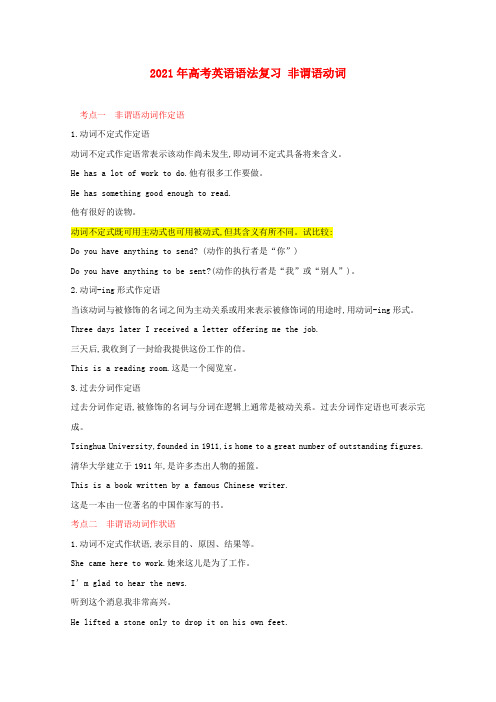
2021年高考英语语法复习非谓语动词考点一非谓语动词作定语1.动词不定式作定语动词不定式作定语常表示该动作尚未发生,即动词不定式具备将来含义。
He has a lot of work to do.他有很多工作要做。
He has something good enough to read.他有很好的读物。
动词不定式既可用主动式也可用被动式,但其含义有所不同。
试比较:Do you have anything to send? (动作的执行者是“你”)Do you have anything to be sent?(动作的执行者是“我”或“别人”)。
2.动词-ing形式作定语当该动词与被修饰的名词之间为主动关系或用来表示被修饰词的用途时,用动词-ing形式。
Three days later I received a letter offering me the job.三天后,我收到了一封给我提供这份工作的信。
This is a reading room.这是一个阅览室。
3.过去分词作定语过去分词作定语,被修饰的名词与分词在逻辑上通常是被动关系。
过去分词作定语也可表示完成。
Tsinghua University,founded in 1911,is home to a great number of outstanding figures. 清华大学建立于1911年,是许多杰出人物的摇篮。
This is a book written by a famous Chinese writer.这是一本由一位著名的中国作家写的书。
考点二非谓语动词作状语1.动词不定式作状语,表示目的、原因、结果等。
She came here to work.她来这儿是为了工作。
I’m glad to hear the news.听到这个消息我非常高兴。
He lifted a stone only to drop it on his own feet.他搬起石头结果砸了自己的脚。
非谓语动词详解以及练习

非谓语动词动词除了在句子中充当谓语外,还具有名词、形容词及副词的性质动词的非谓语形式,可在句中作主语、表语、宾语、定语、补语和状语等,称作非谓语动词,包括动词不定式、分词和动名词。
高考重点要求:1、掌握不定式、分词、动名词在句子中的作用2、区分不定式、分词作定语和状语的异同3、掌握不定式、动名词作宾语,不定式和分词作宾补的惯用结构4、注意非谓语动词与句子谓语动词的时间关系,以确定非谓语动词的时态形式5、弄清非谓语动词与其逻辑主语的关系,以确定非谓语动词的语态形式第一节知识点概述一、动词不定式动词不定式的基本形式是“to+动词原形”,有时可以不带to。
动词不定式没有人称和数的变化,在句子中不能作谓语,但可以担任主语、表语、宾语、状语和宾语补足语。
动词不定式仍保留动词的一些特点。
(一)动词不定式的特征及用法1.动词不定式的构成及特征“to +动词原形”构成动词不定式,是一种非谓语形式,在句子中不能作谓语,没有人称和数的变化,它具有名词、形容词和副词的特征。
2.动词不定式的用法动词不定式具有名词、形容词和副词的特征,在句子中可以作主语、表语、宾语、定语和状语。
1.作主语例如:To learn English well is not easy.或It is not easy to learn English well.动词不定式作主语时,往往用it作形式主语,这种句型可归纳为下面的句型:It is + adj.+ 动词不定式如果要说明不定式的动作执行者,可以用forIt is + adj.+ for sb. to do sth.2.作表语My wish is to become a teacher.3.作宾语Most of us like to watch football matches.4.作宾语补足语He told me to be here on time.5.作定语I have nothing to say about that thing.6.作状语He stopped to have a look.3.动词不定式的否定形式动词不定式的否定形式not + to + 动词原形例如:He asked me not to make such a mistake.4.动词不定式与疑问词连用疑问代词who, what, which和疑问副词when, where, how, why等后面可以接动词不定式,构成动词不定式短语,可以在句子中作主语、宾语、表语等成分。
- 1、下载文档前请自行甄别文档内容的完整性,平台不提供额外的编辑、内容补充、找答案等附加服务。
- 2、"仅部分预览"的文档,不可在线预览部分如存在完整性等问题,可反馈申请退款(可完整预览的文档不适用该条件!)。
- 3、如文档侵犯您的权益,请联系客服反馈,我们会尽快为您处理(人工客服工作时间:9:00-18:30)。
非谓语动词
一.定义:非谓语动词是指在句子中不是谓语的动词,即动词的非谓语形式。
二.分类:动词不定式、v-ing形式和过去分词。
1. 动词不定式(not) to do / (not) do
(1)作主语:
To finish the work today is very hard.
动词不定式短语作主语时,常用it作形式主语,真正的主语不定式置于句后,
例如上面两句可用如下形式:
It is very hard to finish the work in ten minutes. 十分钟之内完成这项工作是很难的。
It means failure to lose your heart. 灰心意味着失败。
It+be+形容词+of /for sb +to do sth.
常用careless, clever, good, foolish, honest, kind, lazy, nice, right, silly, stupid, wise,等(2)作表语:
Her job is to clean the house.
(3)作宾语:
常与不定式做宾语连用的动词有:want, hope, wish, offer, fail, plan, learn, pretend, refuse, manage, help, agree, promise, prefer,
I hope to get good grades. I want to help you.
(4)作宾语补足语:
在复合宾语中,动词不定式可充当宾语补足语,如下动词常跟这种复合宾语:
want, wish, ask, tell, order, beg, permit, help, advise, persuade, allow, prepare, cause, force, call on, wait for, invite.
有些动词如make, let, see, watch, hear, feel, have等与不带有to的不定式连用,但改为被动语态时,不定式要加to,
I saw him cross the road. He was seen to cross the road.
(5)作定语:动词不定式作定语,放在所修饰的名词或代词后。
I have a lot of homework to do.
(6)作状语:
①表目的:
He worked day and night to get the money. \
She sold her hair to buy the watch chain. 。
②表结果(往往是与预期愿望相反的结果意料之外),常位于句尾。
He arrived late only to find the train had gone. \。
③表原因:They are very sad to hear the news
(7)不定式的省略:保留to省略do动词。
If you don't want to do it, you don't need to.
(8)不定式的并列:第二个不定式可省略to。
He wants to study medicine and become a doctor.
2.动名词v-ing形式
(1)作主语:
Eating too much is not good for health.
(2)作表语:
My job is helping the boss with everyday work.。
(3)作宾语:
They haven't finished building the library.
要记住如下动词及短语只跟动名词作宾语:
enjoy, finish, suggest, avoid, excuse, delay, imagine, keep, miss, consider, admit(承认),deny(否认), mind, permit, forbid, practise, risk(冒险), appreciate (感激), be busy, be worth, feel like, can't stand, can't help(情不自禁地), think of, dream of, be fond of, prevent…(from),keep …from, stop…(from),protect…from, spend…(in), succeed in, be used to, look forward to, pay attention to, insist on, thanks for
(4)作定语:
Is there a swimming pool in your school? 你们学校有游泳池吗?
注意:1.有些动词后使用动名词和动词不定式作宾语的差别
1)forget to do 忘记要去做某事(此事未做)
forget doing忘记做过某事(此事已做过或已发生)
2)stop to do 停止、中断(某件事),目的是去做另一件事
stop doing 停止正在做的事
3)remember to do 记住去做某事(未做)
remember doing记得做过某事(已做)
4) regret to do对要做的事遗憾
regret doing对做过的事遗憾、后悔
5)try to do尽全力,努力做某事
try doing尝试做某事
6) mean to do打算,有意要…
mean doing意味着
7)go on to do 继而(去做另外一件事情)
go on doing 继续(原先没有做完的事情)
8)propose to do 打算(要做某事)
proposing doing建议(做某事)
9) learn to do … 学着去做某事
learn doing … 学会做某事
10)can’t help to do…不能帮助做某事
can’t help doing … 情不自禁做某事
11)used to do … 过去做某事
be used to doing … 习惯做某事
12)e /love/hate/ prefer +to do 表示具体行为;+doing sth 表示抽象、倾向概念
(注)如果这些动词前有should一词,其后宾语只跟不定式,不能跟动名词。
I should like to see him tomorrow.
13)need, want, deserve +动名词表被动意义;The room needs cleaning.
+不定式被动态表示“要(修、清理等)”意思。
1.我周日过来学英语。
2.你有什么问题问我吗?
3.我叫他晚上给我打电话的。
4.Brad今天有很多工作要做。
5.别说话了,认真听我讲。
6,周末早起是件很难的事。
7.她看到那张照片时忍不住大笑了。
8.Jenny跳得高高的去摘那些苹果。
9.这周把所有的作业做完对我来说很难。
10.我爸爸正忙着洗车呢。
